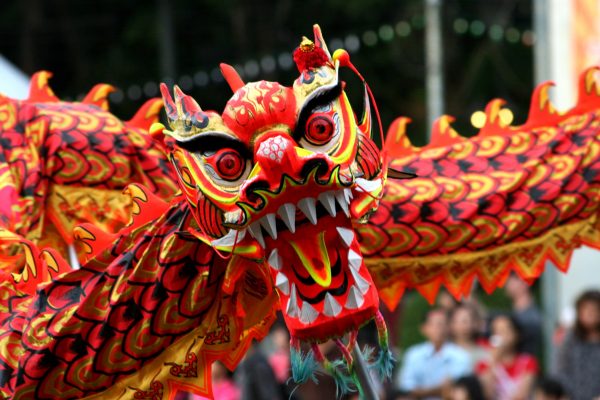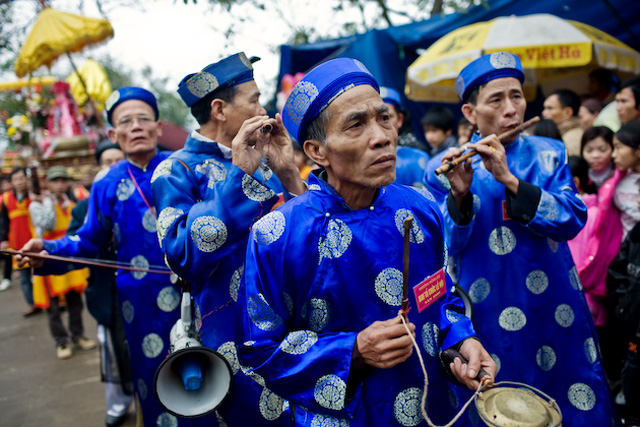Here is a list of traditional holidays in Vietnam. Their dates are all in Vietnamese Lunar Calendar. Some of them are related to agriculture (traditionally the most important sector of Vietnamese economy), some of them have religious meaning, most (many people would say all) of them bear the legacies of the strong cultural relation between Vietnam and South China. The holidays that are still widely celebrated in the modern time are marked with an asterisk.

1. Nguyen Dan* (Lunar New Year): the first three day of the Lunar year. The fact that this is holiday is referred to as “Tet” (the Vietnamese equivalence of “holiday” as mentioned above) shows that this is THE holiday of the year. It is the only traditional holiday that is also an official public holiday i.e. people have days-off. The name “Nguyen Dan” means “new morning” which implies the beginning of a new life cycle.
2. Thuong Nguyen (the first full moon): the 15th day of the 1st month. People visit pagodas, temples and other holy places on this day. There is a Vietnamese proverb saying the homage in the first full moon is the most meaningful. To the Buddhist, this day is the birthday of the Amitabha Buddha. To the rest, it marks the end of the Lunar New Year festivities and the beginning of work.
3. Han Thuc: the 3rd day of the 3rd month. This is a “Chinese” holiday i.e. it is not fully localized when it comes to Vietnam. The name “Han Thuc” means “cold food”. This holiday commemorates a Chinese martyr who died in a fire. On this day, people avoid cooking (and using fire in general) by just using sticky rice and rice cake prepared the day before (hence the name “cold food”). In Vietnam, the real meaning of the holiday is not always remembered and people use cold food more or less just out of the force of habit.
4. Phat Dan* (birthday of the Gautama Buddha): the 8th day of the 4th month. This holiday is relevant mostly to Buddhists but non-Buddhists would also visit pagodas on this holiday. Like the life of Jesus Christ is celebrated on Christmas in the West, the life and teachings of Gautama Buddha are commemorated under different forms: songs, plays, storytelling, etc. Charity events are often held on this day.
5. Doan Ngo* (the beginning of summer): the 5th day of the 5th month. The name “Doan Ngo” means “high noon” and this holiday reminds people that summer is coming. As summer is associated with diseases whose culprit is believed to be the spirits of the heat, people wear charms and perform exorcist rituals on this holiday. The well-educated people also celebrate another meaning of this holiday (which again comes from South China): the death anniversary of the poet-martyr Chu Yuan.
6. Trung Nguyen* (the mid-year full moon): the 15th day of the 7th month. Also known under the name “Vu Lan”. This holiday is an excellent example of how Confucianism, Taoism, Buddhism and the local beliefs live harmoniously together in Vietnamese culture. It is believed that on this day the spirits who cannot enter afterlife in the Underworld are released and a disciple of the Gautama Buddha once gave alms to such wandering spirits. That charitable mentality is celebrated in this holidays. Another relevant legend is about a Buddhist who travelled to the Underworld to rescue his mother (note the filial love characteristic of Confucianism). The legacy of Taoism is the choice of a full moon day for a holiday. On this holiday, people give alms to both wandering spirits and beggars on outdoor altars and visit pagodas to pray for the well-being of parents in both this world and the underworld.
7. Trung Thu* (the mid-autumn full moon): the 15th day of the 8th month. The moon is believed to reach its fullest beauty in autumn and everyone wants to admire it. Thus tea parties with moon cakes and decorated with lanterns and toys are held outdoor. Children are allowed to go around from party to party in the neighbourhood with their colourful lanterns. In public places. there are lion dance and games. Because of its simple joy and lightheartedness that are characteristic of children, Trung Thu is called the holiday of children in Vietnam.
8. Trung Cuu: the 9th day of the 9th month. The name means “double nine” referring to the date. This is another Chinese holiday which is more or less exclusive to the upper class (especially the well educated people) and is almost extinct nowadays. I don’t know the legend associated to this occasion. On this day, scholars go to the mountain to enjoy the scenery and discuss literature (often with rice wine).

9. Ha Nguyen: the 15th day of the 10th month. This holiday is celebrated most wholeheartedly in the rural areas because it marks the end of the harvest season. Hence it is also known as the “New Rice” holiday. Part of the newly harvested rice would be used to pay homage to the deities and the ancestors.
supported by HanoiRealEstate.com.vn
